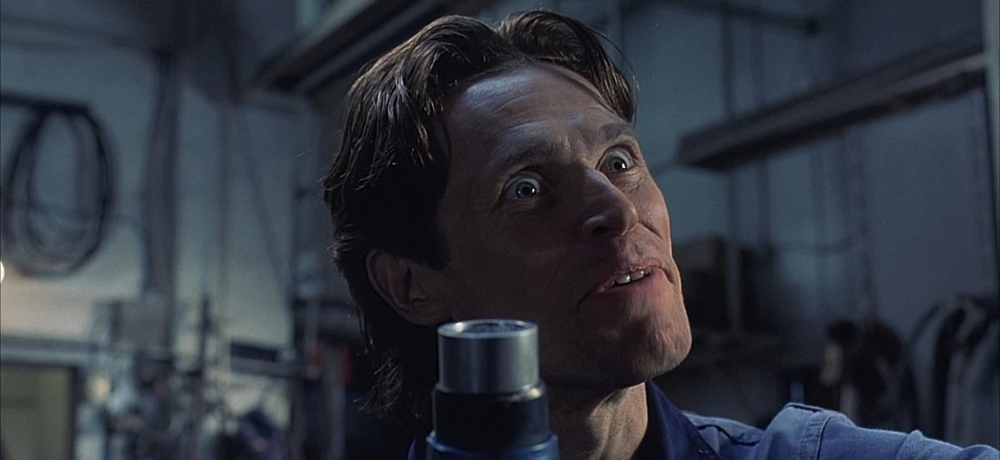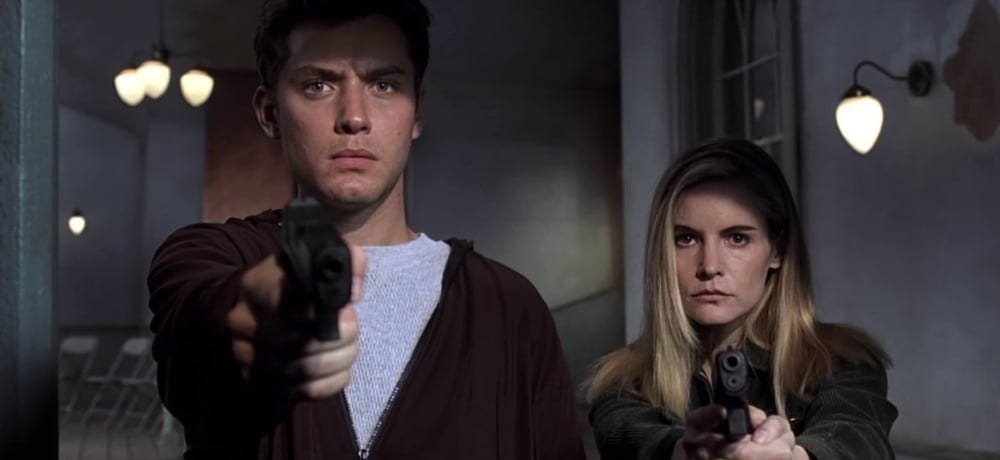


Welcome back to Let’s Scare Bryan to Death! This month, we’re talking to Joe Lipsett, who you probably best know as co-host on Horror Queers, a podcast that explores horror movies through an LGBTQ lens. But of course, Lipsett also has bylines all over the place, including Bloody Disgusting, Anatomy of a Scream, Grim Magazine, and more (your best bet to keep up with all of it is probably at his website).
As you may already know, in addition to being a proud horror fan, Lipsett is also a very proud Canadian, so of course this month’s movie comes from none other than David Cronenberg, as we dig into his 1999 sci-fi thriller eXistenZ. The film takes place in a near-future where video game technology has blended biology and technology for a virtual reality experience that, in true Cronenberg fashion, involves vaguely sexual game ports that plug directly into people’s spinal cords.
When famed game developer Allegra Gellar (Jennifer Jason Leigh) facilitates a test group for her newest game, eXistenZ, she’s attacked by an assassin representing Realists, a group morally opposed to the way video games warp reality. She’s rescued by low-level publicist Ted Pikul (Jude Law), but her prototype for the eXistenZ system is compromised, so Gellar and Pikul go on the run, both laying low to avoid any more Realist assassins and entering the eXistenZ platform to make sure it still functions. But as they dig deeper into the game, the veil between the game and reality indeed becomes hard to distinguish, and danger could be lying in wait inside or outside eXistenZ (SPOILER ALERT: We will be discussing the film’s ending as part of the conversation about its themes).
As a lifelong Cronenberg fan, Lipsett has fond memories of seeing eXistenZ when it was first released, right around the time of another VR-based sci-fi film that you may have heard of.
This is a personal favorite of mine, in particular there's a nostalgic component to it. This came out when I was working in a movie theater, so it’s the first Cronenberg that I actually got to see on the big screen. But I think to me it's such a testament to what was concerning people in the year 1999, because it's one of four different films [that year] that deals with virtual reality and simulated reality. And I think it's so reflective of the fact that we were deeply, deeply concerned of what the new millennium was going to offer and our concerns around technology. So it's like eXinstenZ, Dark City, The 13th Floor (which nobody remembers), and The Matrix.
Although eXistenZ had nowhere near the budget of the Wachowskis’ magnum opus, Lipsett cautions against simply writing it off as the low-budget version of the same film. eXistenZ isn’t a world of immaculately dressed techno-warriors flying around on wires in bullet-time. This is very much a Cronenberg movie, and one that aligns with his vision.
This is a very deliberate aesthetic. This is the film he wanted to make. This is not a case of limited resources... at the time, this film, which cost around $34 million to make, was the highest-budgeted Canadian film of all time. But I think what you picked up on is that it's easy to look at this film and say that it looks kinda cheap and a little too “real world.” Like when you think of the scenes at the farm, in the garage, it’s disgusting... hell, it just looks so poorly lit. But those are absolutely choices that Cronenberg made. He wanted it to look those particular ways, because he's trying to cue you to the fact that they are already in the gaming environment and this isn't real life. This isn't The Matrix “red pill, blue pill” where the artificial life is gorgeous and shiny. That's very much a Hollywood sensibility that Cronenberg is not interested in engaging with.
And even when you think of The Matrix, the real-world scenes where everybody has artfully deconstructed clothing. Like, the rips are in all the right places, they've clearly been put together by a costume department. I think [in eXistenZ] the most stylish component of the film is Allegra's clothes when they actually get into “eXistenZ” and she looks super model-y. Her hair is strategically crimped and she looks sexy, but even then you're like, “Does she look better than your average businesswoman who is dressed up for a day at work?” Probably not.
Not only is eXistenZ true to Cronenberg’s sensibilities, it actually represents a return to the body horror subgenre that he had all but cornered in the mid-’80s. Surprisingly, however, blending that body horror with the virtual reality elements seems to have thrown even some hardcore Cronenberg fans for a loop.
I think [Cronenberg fans] were excited because they thought he was returning to “the genre,” because you know Madame Butterfly, Naked Lunch, and of course Crash, those are all dramas. Like, he had lost his way from body horror, which is what everybody loved and knew him for. But I think the common complaint about this film was that it felt like a watered-down version of Videodrome, whereas he actually looks at it as like a de facto sequel or a brand extension of Videodrome.
And I think he's acknowledged that the world has changed, right? Videodrome is very much about Canadian airwaves infected by American signals, which is so Canadian. Whereas eXistenZ acknowledges the fact that the world has collapsed into such a small amount of space that we are all now connected and the place that we meet is virtual. It's so prescient of what would become of social media and the internet at a time when that's really only just starting to pick up.

One particular Cronenberg-ism prevalent in eXistenZ is his tendency to remove any romanticism or glorification out of violence. Here, as it is in many of his films, Cronenberg makes the audience take a look at the messy consequences of violence, and that, combined with the anti-video game sentiment held by a lot of the characters, might indicate that Cronenberg is speaking out against video games. But Lipsett explains that Cronenberg is thinking a bit more broadly regarding our expectations about art.
Cronenberg’s kind of on the record saying he's not interested in video games. So I don't think he has a horse in the race of saying like video games are violent and they're perverting us. I think he's looking at this more as a facet of artistic creation, and do we blame creators when they introduce things like violence, and when they force us into uncomfortable situations that require us to reflect on why we're doing and why we're taking enjoyment out of this. Not to get to film school with it, but for the first time when I was rewatching this, the film reminded me of Goddard’s Weekend, which feels like a very aimless film: people just kind of wandered from set piece to set piece, it’s visually interesting, the characters are kind of flat, and they don't really pop. And of course, Goddard’s big thing is that he doesn't want you to actually care about the film. He wants you to reflect on your experience as a viewer and the parts that you play in shaping narratives with your expectations, with your dollars and so on. Really, it’s the same kind of feel here with eXistenZ, where it's like, “I'm making art that's interesting and provocative, but I also want you as an audience member to be reflective of why we expect violence in this.” Why are we okay with them showing up to a Chinese restaurant which is literally called “Chinese Restaurant” so that they can shoot the Chinese waiter who never gets a name?
And I think one of the reasons people don't always love this movie is that by this point in the film... it feels like the film is actually going off the rails. The plot has been lost, we're not really sure what's happening, but if you're paying attention, we've already also heard Jude Law say, “I'm not really sure why people are playing this game. It seems to have no goals, it’s just very violent and I feel very uncomfortable.” And Allegra tells him, “Oh, well, that sounds like real life.” That's what this film is. It's not attempting to be sensical, but it is trying to make you think about, “Okay, what is it that I expect from cinema?” What have we been preconditioned to go into films like this and see? We don't get a rousing hurrah at the end of this movie, and all these steps feel very deliberate. But they're also not satisfying to us, so if you go into eXistenZ saying, “I want a great sci-fi simulation movie,” that's not what he's giving you. It's very uncomfortable for a lot of people.
Lipsett explains that the discomfort and grunginess in the film may cause some people to miss the astute cultural satire Cronenberg presents to us.
I've shown this film to a lot of people. I used to teach a class about the convergence of humans in technology and I would screen this as a counterpoint to films like The Matrix, which always rubbed my students the wrong way because they like the glossiness of these future perspectives, like, “We want flying cars, we want the clean lines! We don't want genetically modified amphibian guns.” [The scene where Willem Dafoe offers to perform a black market procedure to install a game port into Jude Law’s character] is the point where the audiences are still on board with the movie. When we get to the gas station, one point is that Willem Dafoe is amazing and people always love his brand of weirdness, but also the film hasn't gotten to a stage where it's like, “What, wait, I don't understand why are we going here?”
So you can see the parody and satire and Willem Dafoe saying, “Step into my office!” And it's a chair that looks like someone's been murdered in it. And Allegra Gellar's like, “It doesn't matter. We'll just get you outfitted with this thing where we’ll basically shoot a cattle prod into your spine. It's fine 'cause they do it at the mall, it's like getting your ears pierced.” The comedy and the commentary are so sharp and on point, but I feel like people don't give that kind of credit because they look at the film and they think it's ugly.
Another Cronenberg motif at play is an exploration of sexuality, which of course lends itself to further comparison to Videodrome. But where Videodrome explores sex through the lens of exploitation cinema, eXistenZ seems more concerned with the disconnect between sex and art in the digital age.
Videodrome is kind of like late-night, sleazy erotica, right? It's almost exactly what you would expect the signals to be that James Woods is trying to protect against, or maybe activate [in that film]. I always feel like eXistenZ is that commentary on like, it's not necessarily about AIDS and STIs and stuff, but it is kind of about sexualized opportunities, but without the sex. The gameplay, literally plugging into the game requires an act of penetration, you have to get penetrated. But then there's all these themes of disease and infections that carry through. Literally Pikul's entire arc is he gets penetrated, and then gets infected, and it gets cleaned up, and then it gets infected again. But if you look at it, there's sex all throughout. The game port looks like a breast with the nipple that flicks to turn on, it shakes and quivers with sexual excitement. It's literally porting into bodies, there's an umbilical cord that looks like it's feeding information. It's all very organic in a way that is sexualized, but never “sexy.” Cronenberg definitely addresses that he sees this movie as infused with sex, but not sex that people act on, because the active gaming becomes kind of the foreplay of the sexual encounter.
If you see this whole movie as a commentary on filmmaking as a process, Allegra Gellar is the director. She crafts a vision and people go through it, but when you see what she's created... they even make fun of that one character for having bad dialogue in that bad accent. It's kind of like, this is not a game I would enjoy playing. It’s mundane and it takes you to gross places. This is Cronenberg saying, “I'm a weirdo like Allegra Gellar, who's an outsider trying to make interesting, creative art.” But the game eXistenZ acts like a critique of boring, stilted filmmaking. So it makes sense that there's kind of this perfunctory sex, but it's also just in there because it's what their game characters would be expected to do. It's in there because the studio mandated that if you've got Jennifer Jason Leigh and Jude Law, you're gonna have them bump together. But also Cronenberg's interest in doing so is, “Here, I'll give it to you, but I'm also not going to give it to you.”

As the film builds to a climax, Cronenberg makes the narrative threads harder to follow. But just as logic seems to have been utterly abandoned, with seemingly disparate elements and characters coming together in a bizarre, seemingly ill-conceived battle sequence, we find out that everything we’ve seen from the opening frames of the movie has all been part of one big VR simulation. It’s only in the final scene that we see the real world (maybe?), but even with that reveal, Lipsett explains that a lot of people think the film gets too murky by the end.
I think there are a lot of people who feel like the last act of this movie fumbles the ball. Anything to do after the Chinese restaurant scene where they go back and you don't know who to trust, suddenly there's an infected pod that [Gellar] wants to play, we're just like, “Girl, no. Stop that.” And then they bring that back to the room and I think for a lot of people that feels so confusing and disjointed, and then guerillas show up and people are dying all over the place. I can appreciate why people watch this movie and think it just really fumbled the ending and it didn't come together. But for me it's the kind of film that rewards a repeat viewing because when you know that's what this film is trying to do, it's actually quite a bit more satisfying. But it's also not confusing. It's very well shot and very well edited, and the spaces make sense in terms of even when it doesn't feel real, it's real enough. There's something naturally organic about it that I think is visually pleasing even if the story doesn't always satisfy.
And for Lipsett, the film ultimately represents classic Cronenberg, and a fitting end of an era, as eXistenZ represents the last of his filmography produced exclusively in Canada and based solely on his material.
It’s that and the fact that this feels, as you suggested earlier, it almost feels like classic Cronenberg. I don't want to belittle the non-genre films because I think they're all great in their own way, like they have their own kind of merit, but it's really easy to watch eXistenZ and feel like it's an homage and a greatest hits compilation. He’s playing in a familiar sandbox, but he's bringing in a lot of the same ideas, just in an updated form. I think it's a really great way to wrap up the century for him, where he’s reflecting back on all the interest that he’s had. He's bringing in the same sense of style, the quirky characters, the playfulness, but also the meditations on technology and sexuality. And it all kind of comes into a synthesis film and that happens to be eXistenZ.